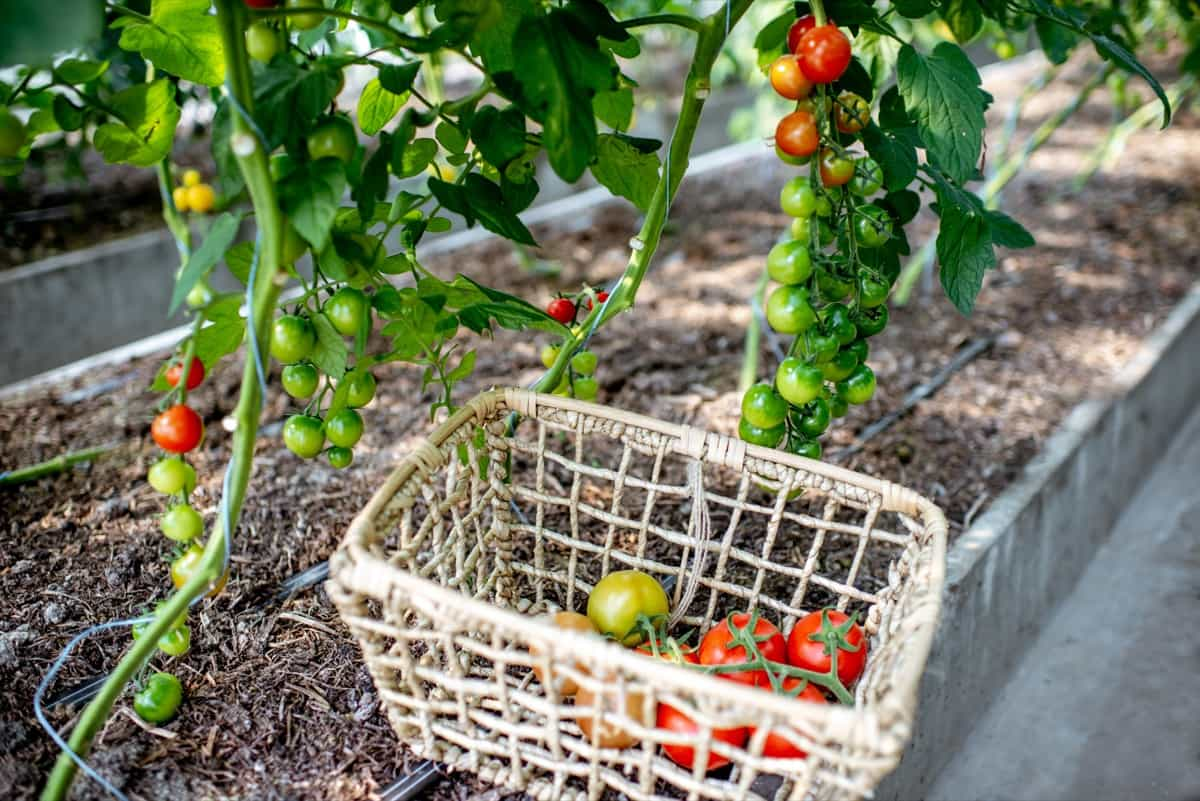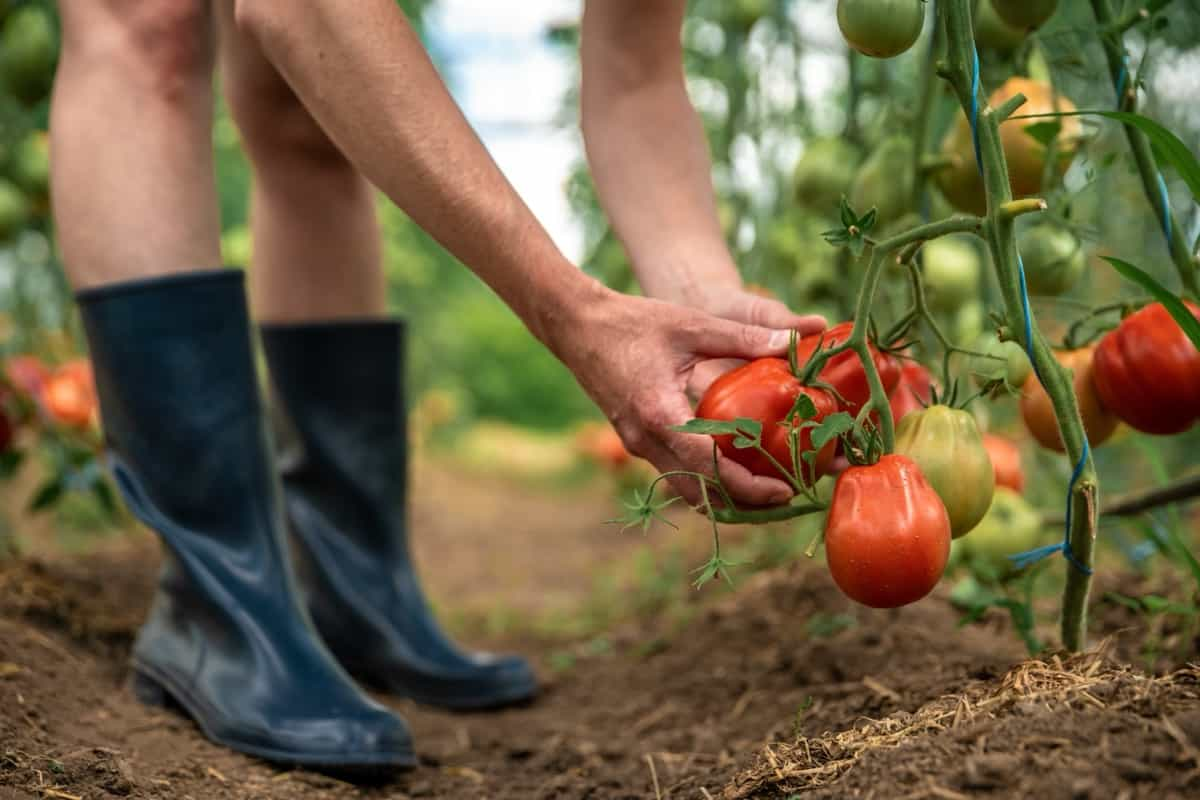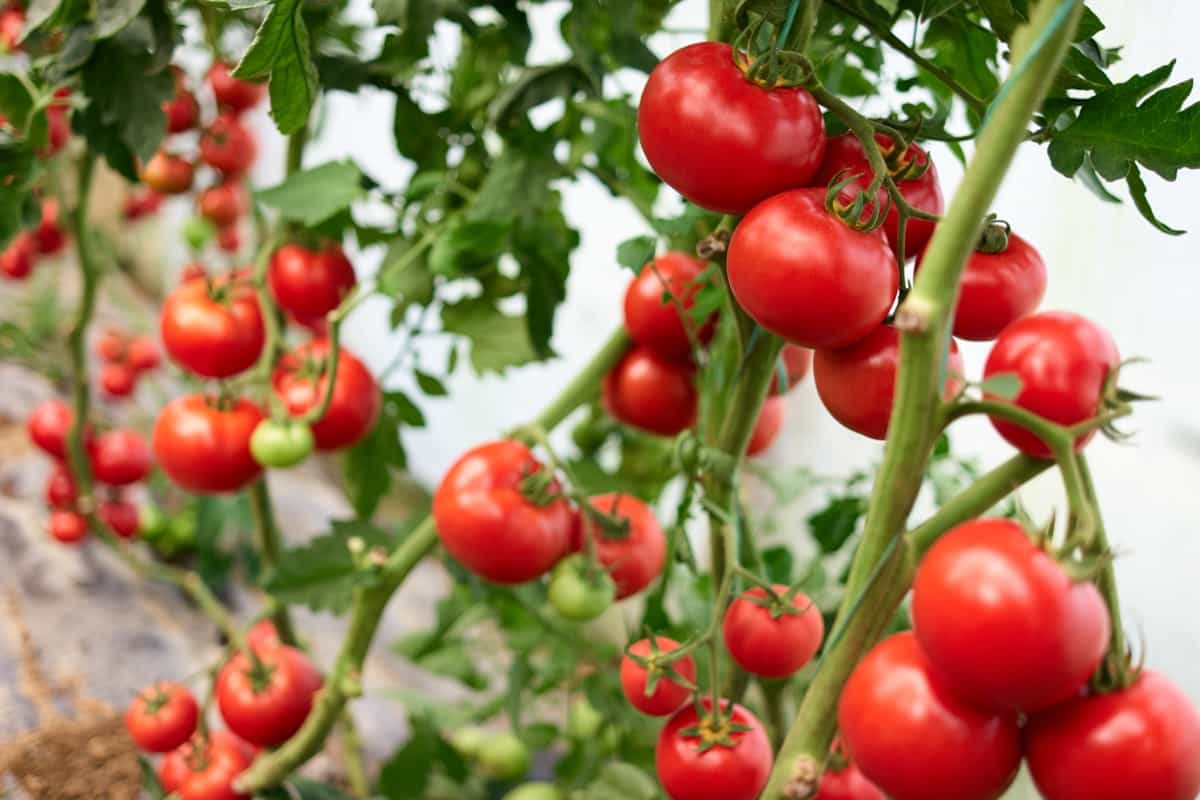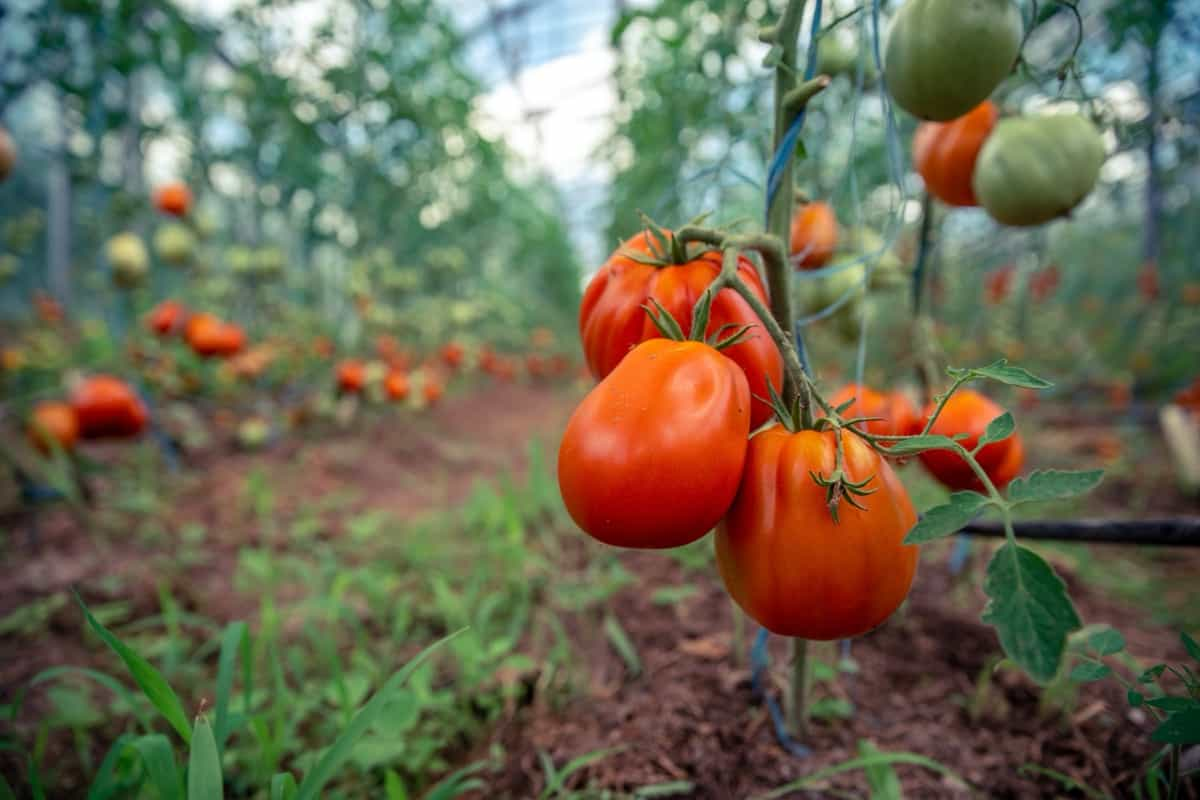Tomato farming is a profitable activity that offers high-quality tomatoes but faces challenges like pests, diseases, and soil fertility. To address these, some farmers adopt biodynamic practices, which focus on enhancing soil, plant, and animal health. This holistic approach uses organic and natural inputs, respects diversity, and avoids synthetic chemicals, genetically modified organisms, and artificial interventions. Biodynamic tomatoes are more nutritious, flavorful, resistant to pests & diseases, and have a longer shelf life, which can fetch higher market prices.

Tomato Farming with Biodynamic Practices
Biodynamic Tomato Farming: Understanding the Cosmic Influences on Soil Health
Biodynamic tomato growing is a unique method that considers how the stars affect the health of the soil. It’s more than just farming because planting and harvesting are timed to match lunar and celestial rhythms. The moon, planets, and stars are thought to affect dirt and plant growth in this way.
To make the earth healthier, farmers use special mixtures and natural compost. Biodynamic farming tries to make healthier, better tomatoes while supporting sustainable farming by working with these cosmic rhythms. It’s like a dance between the stars that helps tomatoes grow in peace with nature. This makes them tasty and good for the planet.
Using Fermented Manure Tea for Optimal Tomato Growth
One great way to help your tomato plants grow is to use fermented manure tea. How it works: First, get some cow or horse manure sitting around for a while. Add water and put it in a bucket. Leave it alone for about a week and stir it now and then. This makes a “tea” for your plants full of nutrients.
When it’s ready, add water to keep it from fertilizing excessively. Then, use this mixture to water your tomato plants. Niacin and phosphorus, which are natural nutrients in the tea, will help your tomatoes grow and stay healthy. It’s good for the environment and will help your garden grow.
Composting with Cosmic Rhythms: Creating a Holistic Fertilizer for Biodynamic Tomatoes
Composting with Cosmic Rhythms is a powerful fertilizer for biodynamic tomato plants, providing more nutrients and energy absorption. You can create a complete fertilizer that supports tomato growth by timing your efforts with solar and cosmic cycles. This method lets you stay in tune with nature and the world, ensuring optimal nutrition and energy absorption for your tomato crop.
In case you missed it: How to Maximize Tomato Yields with Precision Farming Techniques

Moon Phases and Planting Times for Ideal Tomato Yields
The moon’s stages can affect how well you garden, including how well you grow tomatoes. You may get higher harvests if you plant tomatoes at certain times of the moon. The “waxing” and “full” moons are two important stages. It’s best to plant tomatoes and other plants that grow above ground when the moon is waxing, which means it’s getting lighter.
Another great time to plant is during the full moon when the moon is completely lit up. People think that these phases of the moon help plants grow and make more food. Remember that other things, like soil quality, weather, and temperature, are also important for a good tomato harvest, even though moon-phase gardening can be fun.
The Importance of Demeter-Approved Seeds for Biodynamic Tomato Farming
For biodynamic tomato gardening, you need seeds approved by Demeter. Extra care is taken to grow these special seeds so they don’t have any dangerous chemicals or genetically modified traits. They help keep the ecosystem in order when used in biodynamic farming, which makes tomatoes healthier and tastier.
The Demeter standards also stress the health and sustainability of the land. This means that the seeds are planted in living, nutrient-rich soil. This helps plants grow faster and be less likely to get pests or diseases. Biodynamic farmers support a holistic approach to farming by using Demeter-approved seeds. This makes tomato crops that taste better and are better for the earth.
Using Natural Pest Control Methods: Companion Planting and Beneficial Insects
In biodynamic tomato growing, we use natural ways to keep pests away from our plants to keep them healthy. Companion planting and helpful insects are two important ways to do this. When we grow certain plants next to tomatoes, they automatically keep pests away or bring in good bugs. This is called companion planting. Some plants, like basil and marigolds, can keep bugs away.
We can fight pests with the help of good bugs like ladybugs and parasitic wasps. They eat bugs that are bad for our tomato plants. We can avoid using chemical pesticides this way, which makes our tomatoes taste better and is better for the earth. That’s like having nature’s bug squad in our tomato patch!
Crop Rotation and Soil Care for Sustainable Tomato Production
Crop rotation and soil maintenance are crucial for sustainable tomato cultivation utilizing biodynamic methods. To prevent soil erosion, crop rotation involves growing crops in the same field yearly. This keeps the soil fertile and helps prevent soil illnesses. Using natural and organic means is the main focus of biodynamic practices.
In case you missed it: Tomato Farming with Mulch: How to Use Organic Materials for Better Soil Health and Yield

Farmers utilize cover crops, compost, and mineral and herb treatments to maintain the soil. Tomato plants grow better due to these techniques, which improve soil health and biodiversity. Crop rotation and biodynamic practices enable sustainable tomato production that improves the environment and the quality of the tomatoes we eat.
Biodynamic Tomato Harvesting and Storage Techniques for Maximum Shelf Life
Biodynamic tomato harvesting and storing methods aim to preserve tomatoes’ natural qualities while extending their shelf life. Farmers choose tomatoes at the ideal moment, which is typically when they are fully ripe, and handle them carefully to prevent bruising to achieve this.
To keep them from overripening, tomatoes are kept cool and dry after harvest, sometimes even in a root cellar. Using natural preparations to increase the tomatoes’ vitality is another aspect of biodynamic methods. These techniques are combined in biodynamic farming to guarantee that tomatoes remain sweet and fresh for longer, giving us more time to savor their delicacy.
Integrating Bees and Pollinators into Biodynamic Tomato Farms for Improved Fruit Set
Including bees and other pollinators in biodynamic tomato, fields entails extending an invitation to these beneficial animals to stop by and aid in tomato growth. For tomatoes to grow, bees and pollinators like butterflies must transfer pollen from one bloom to another. This pollination improves fruit yield like a “matchmaking” service for plants.
By encouraging bees and other pollinators, biodynamic farming is an organic, environmentally beneficial method of growing food that gives tomato plants the best chance of bearing an abundance of mouthwatering fruits. Thus, both the environment and your tomato crop will benefit!
The Role of Silica in Biodynamic Tomato Farming: Enhancing Flavor and Disease Resistance
Silica is essential for increasing disease resistance and flavor in biodynamic tomato growing. Tomato plant’s cell walls are strengthened by silica, which increases its resistance to diseases and pests. Thus, fewer pesticides will be needed to maintain healthier plants. The tomatoes taste better, which is an extra plus.
Tomatoes acquire a deeper, richer flavor with the aid of silica. Therefore, in biodynamic farming, producers can enjoy sweeter tomatoes while lowering the need for hazardous pesticides to safeguard their crops by raising the silica level in the soil or natural preparations, producing a win-win situation for taste buds and the environment.
Biodynamic Tomato Farming: A Holistic Approach to Producing Nutritious and Delicious Tomatoes
Biodynamic tomato farming aims to grow nutritious, nutrient-rich tomatoes while honoring nature’s cycles. This technique goes beyond organic farming, using compost and herbal treatments to improve soil fertility and plant health. Farmers ensure sustainability and biodiversity by adhering to lunar and astronomical cycles while promoting a balanced environment for healthy, tasty tomatoes.
Frequently Asked Questions (FAQs) on Tomato Farming with Biodynamic Practices
What Is Biodynamic Tomato Farming?
The holistic and sustainable method of biodynamic tomato farming emphasizes the relationships between plants, animals, and the environment. It strives to maintain the cycles and rhythms of nature while yielding tasty and nourishing tomatoes.
In case you missed it: Tomato Farming with Cover Crops: How to Use Legumes for Better Soil Health and Yield

How Does Biodynamic Farming Differ from Organic Farming for Tomatoes?
Biodynamic farming goes beyond organic methods by adding spiritual and cosmic components—such as moon planting and unique soil-enriching preparations.
Do Biodynamic Tomato Farms Use Chemicals or Synthetic Fertilizers?
No, biodynamic farms stay away from artificial fertilizers and chemicals. Instead, they rely on organic techniques like composting, cover crops, and herbal remedies to improve soil fertility.
What Role Does Lunar Planting Play in Biodynamic Tomato Farming?
The optimal dates for seeding, transplanting, and harvesting tomatoes are determined by lunar planting, which tracks the moon’s phases. It is thought to affect the flavor and growth of plants.
Conclusion
Biodynamic tomato farming is environmentally friendly and enhances soil health and plant vitality using natural methods, lunar and celestial cycles, and Demeter-approved seeds. It promotes better-tasting, nutritious tomatoes, reduces chemical pesticide use, and supports a healthier planet through companion planting, beneficial insects, and careful harvesting.
- Feed Your Flock for Less: Top 10 Tips to Save on Chicken Feed
- Ultimate Guide to Ossabaw Island Hog: Breeding, Raising, Diet, and Care
- Hatching Answers: The Top 10 Reasons Your Chickens Aren’t Laying Eggs
- Eggs and Economics: Breaking Down the Cost of Raising Backyard Chickens
- Defend Your Greens: Proven Methods to Keep Iguanas Out of Your Garden
- Ultimate Guide to Cinnamon Queen Chicken: A Comprehensive Guide for Beginners
- Ultimate Guide to California Tan Chicken: Breeding, Raising, Diet, Egg-Production and Care
- Ultimate Guide to Marsh Daisy Chicken: Breeding, Raising, Diet, and Care
- 10 Types of Chicken Farming Businesses You Can Start for Profits